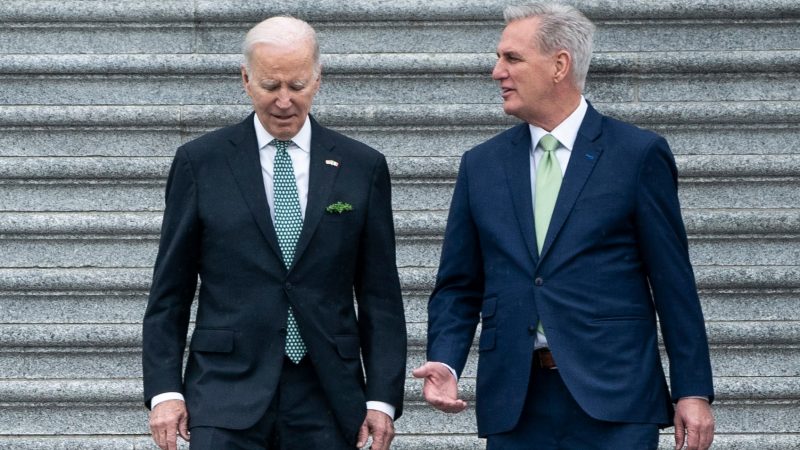The debt ceiling deadline is fast approaching, and Washington is stuck. If Republicans and President Biden can’t agree on how to raise the debt ceiling in the next month, the United States could be forced to stop paying its bills, which could tip the country into a recession.
But there are some lesser-known ways out of this bind, including making money out of thin air to pay the government’s bills or just ignoring the debt ceiling altogether.
Here are five ways this debt ceiling standoff could end.
1. Biden and House Republicans reach a deal: Let’s get the obvious out of the way. Congress usually needs to raise the debt ceiling at least once a year, and the U.S. has never missed the deadline in a serious way. (Washington got close to a default on U.S. debt payments in 2011, also when there was a Democratic president and a Republican-controlled House of Representatives.) This moment feels similarly intense, economist Julia Coronado said.
The proposal Republicans put forward to raise the debt ceiling is untenable for Democrats. It would save trillions over the next decade by cutting money from Biden’s climate program and slashing federal spending on everything from affordable housing to Medicaid. But Biden is meeting with congressional leaders next week in a sign that he might see an opening to negotiate. “Someone is going to have to blink,” Coronado said.
2. Democrats make a deal with moderate Republicans: Congressional Democrats have been quietly putting together another option. They will try to convince at least five House Republicans to sign a petition alongside Democrats to force a vote on raising the debt ceiling. The method is called a discharge petition, and it’s a way for a majority of House lawmakers to get around House leaders, like Speaker Kevin McCarthy (R-Calif.). But it would require a handful of Republicans to join Democrats and go over his head. Lawmakers have tried and failed in the recent past to use a discharge petition on issues like immigration and the minimum wage.
3. The U.S. defaults on its debt: Leaders in Washington on both sides want to avoid this. Without legislation from Congress, the government could run out of money to pay most of its bills by June 1, Treasury Secretary Janet L. Yellen has said. It would not be able to borrow money to pay for Social Security, issue tax refunds or pay the salaries for federal workers and members of the military. The stock market would probably plummet. The U.S. would be seen as an unreliable business partner across the globe. Cars and homes would get even more expensive because interest rates would shoot up. The U.S. could tip into a recession. People would lose their jobs.
4. Biden declares the debt ceiling is unconstitutional: This is a dramatic option. It’s loosely the equivalent of Biden issuing an executive order to go around Congress. Biden could read a Civil War-era section of the Constitution in such a way that declares the debt ceiling law unconstitutional. The argument is that Congress also has a law on the books saying that the federal government needs to pay its bills. “If he stops paying bills,” David Super, an economist at the Georgetown University Law Center, said by way of explanation, “he’s breaking the law.”
Former president Bill Clinton said of the last debt ceiling standoff in 2011 that if he were president, he would have used this “without hesitation.” But President Barack Obama chose to strike a deal with Republicans. The U.S. credit rating got dinged for the first time in history after negotiations ran right up to the debt ceiling deadline. If Biden were to just ignore the debt ceiling, it could get tied up in court, or House Republicans could retaliate by refusing to pass spending bills that could lead to a government shutdown this fall.
5. The Treasury Department issues a $1 trillion coin: This would create money essentially out of thin air to pay government bills. It’s a fairly straightforward way to buy some time, Super argued. The U.S. has spent about $3 trillion since October. The notion sounds wacky, but it’s based off a law that gives the Treasury Department authority to mint any amount of coin it wants to. And as debt ceiling battles have become more frequent, this idea has been treated seriously lately in intellectual circles. Except for the person who arguably matters the most here: Yellen has dismissed this idea as a gimmick.








